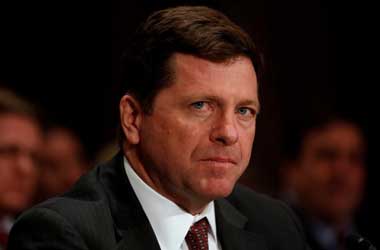 Yesterday, the Committee on Banking, Housing, and Urban affairs met in an open session and conducted a hearing on Virtual Currencies: The Oversight Role of the U.S. Securities and Exchange Commission and the U.S. Commodity Futures Trading Commission.
Yesterday, the Committee on Banking, Housing, and Urban affairs met in an open session and conducted a hearing on Virtual Currencies: The Oversight Role of the U.S. Securities and Exchange Commission and the U.S. Commodity Futures Trading Commission.
Jay Clayton, Chairman, U.S. Securities and Exchange Commission, and Christopher Giancarlo, Chairman, U.S. Commodity Futures Trading Commission provided testimony to the Senate Banking Committee to bring greater focus to the important issues that cryptocurrencies, initial coin offerings (ICOs) and related products and activities present for American investors and our markets.
Clayton opined that there are historical instances where a rush into certain investments has benefitted the US economy and also the investors who backed the right ventures. Further, Clayton said that developments in financial technology will assist in facilitating capital formation, while providing promising investment opportunities for institutional and main street investors.
However, Clayton cautioned
regardless of the promise of this technology, those who invest their hard -earned money in opportunities that fall within the scope of the federal securities laws deserve the full protections afforded under those laws. This ever -present need comes into focus when enthusiasm for obtaining a profitable piece of a new technology “before it’s too late” is strong and broad. Fraudsters and other bad actors prey on this enthusiasm.
The important points in the testimony are as follows:
- Many trading platforms are even referred to as “exchanges.” I am concerned that this appearance is deceiving.
- It appears that many of the U.S.-based cryptocurrency trading platforms have elected to be regulatedas money-transmission services. Traditionally, from an oversight perspective, these predominantly state-regulated payment services have not been subject to direct oversight by the SEC or the CFTC.
- The SEC regulates securities transactions and certain individuals and firms who participate in our securities markets. The SEC does not have direct oversight of transactions in currencies or commodities, including currency trading platforms.
- If a cryptocurrency, or a product with its value tied to one or more cryptocurrencies , is a security, its promoters cannot make offers or sales unless they comply with the registration and other requirements under our federal securities laws.
- cryptocurrency activities should not undermine anti-money laundering and know -your-customer obligations. As I have stated previously, these market participants should treat payments and other transactions made in cryptocurrency as if cash were being handed from one party to the other.
- There are a number of issues that need to be examined and resolved before we permit ETFs and other retail investor-oriented funds to invest in cryptocurrencies in a manner consistent with their obligations under the federal securities laws. These include issues around liquidity, valuation and custody of the funds’ holdings, as well as creation, redemption and arbitrage in the ETF space.
- On July 25, 2017, the SEC issued a detailed report which explains that issuers of distributed ledger or block chain technology-based securities must register offers and sales of such securities unless a valid exemption from registration applies, and that platforms that provide for trading in such securities must register with the SEC as national securities exchanges or operate pursuant to an exemption from such registration. Those who would use distributed ledger technology to raise capital or engage in securities transactions must take appropriate steps to ensure compliance with the federal securities laws.
- Those who would use distributed ledger technology to raise capital or engage in securities transactions must take appropriate steps to ensure compliance with the federal securities laws.
- Merely calling a token a “utility” token or structuring it to provide some utility does not prevent the token from being a security.
- Engaging in the business of selling securities generally requires a license, and experience shows that excessive touting in thinly traded and volatile markets can be an indicator of “scalping,” “pump and dump” and other manipulations and frauds.
From the details presented above, we infer the following:
- Anonymous and private crypto currency transactions may be deemed illegal according to point 5.
- As of now, ETFs (Exchange Traded Funds) will not be approved in the US (point 6)
- According to point 7 & 8, most of the ICO offerings would be subject to federal security laws and requires registration with the SEC.
The U.S. Senate Committee on Banking, Housing, and Urban Affairs is one of twenty Senate committees tasked with conducting Senate business related to specialized areas of legislative interest. the Committee plays an integral role in managing legislation that affects the lives of many Americans. These areas of jurisdiction include, but are not limited to: banking, insurance, financial markets, securities, housing, urban development and mass transit, international trade and finance, and economic policy.

 United States
United States United Kingdom
United Kingdom















